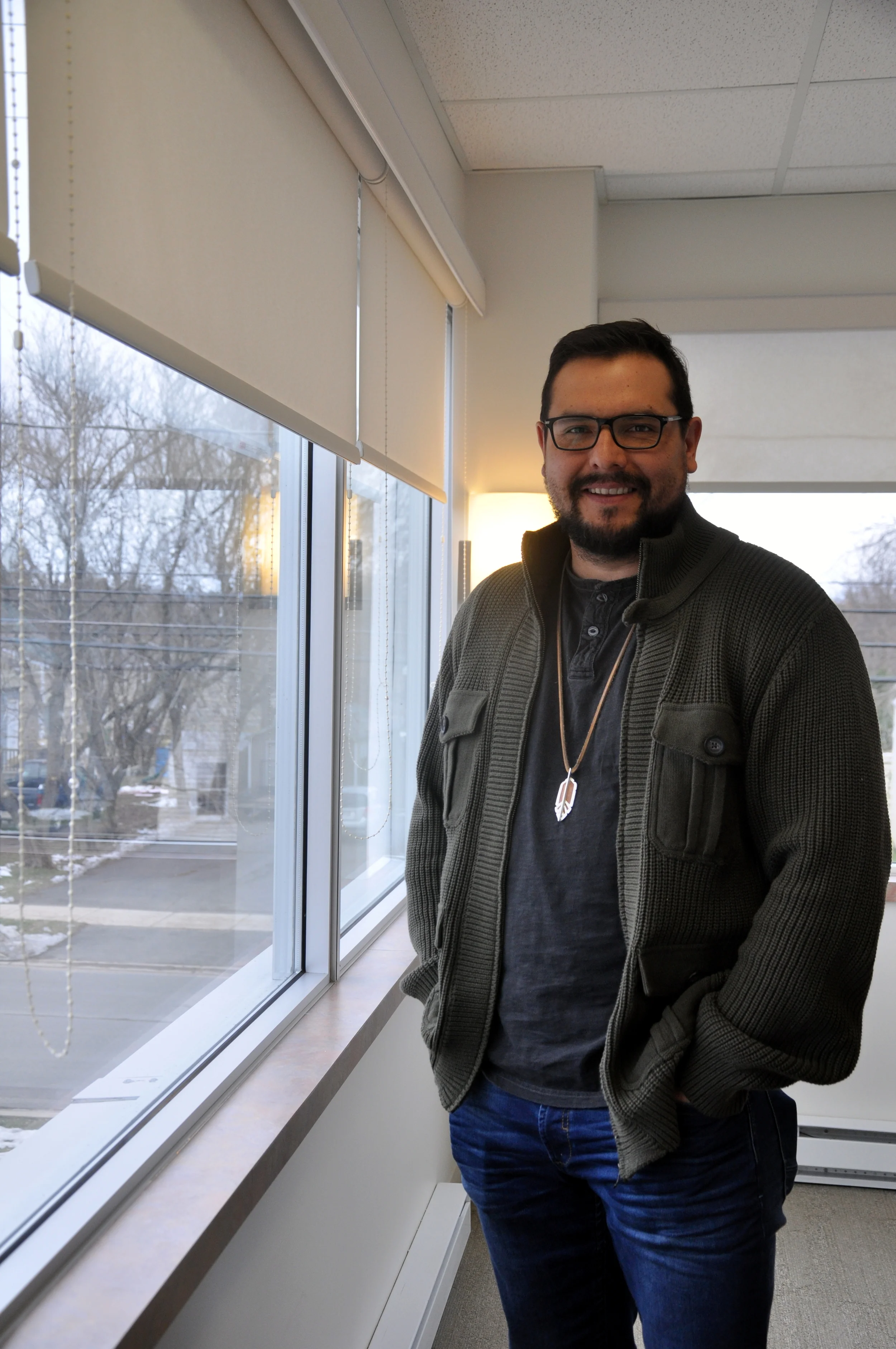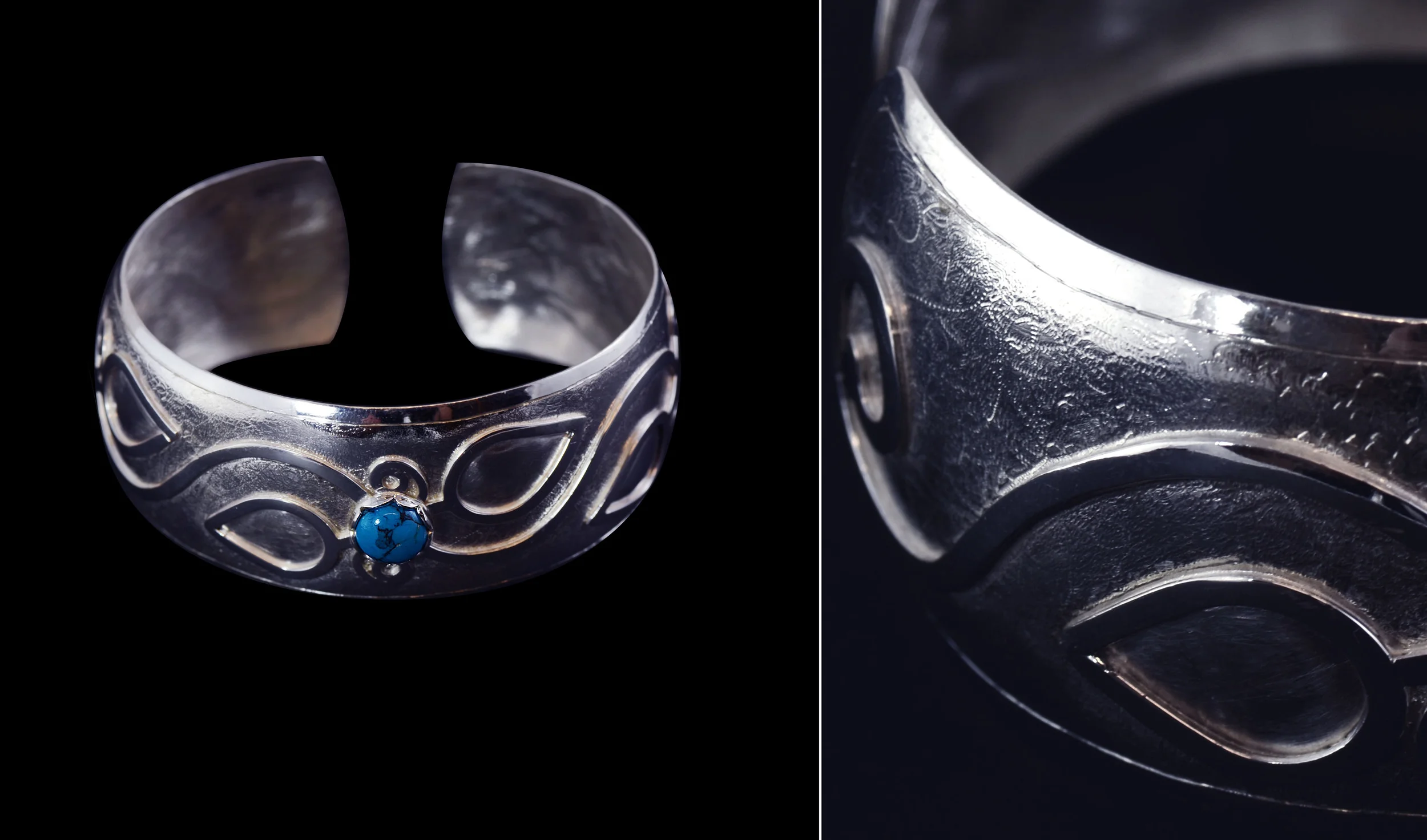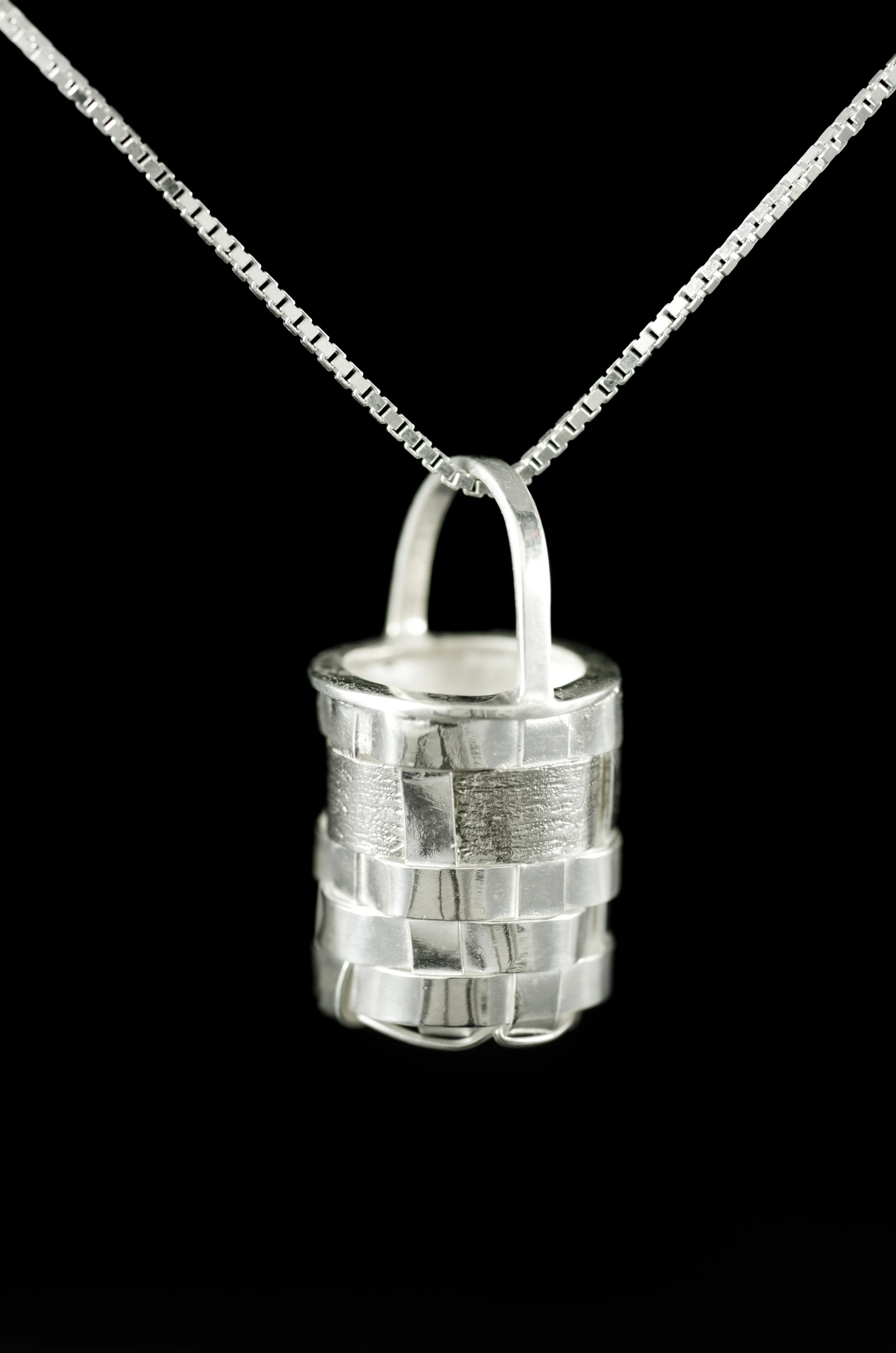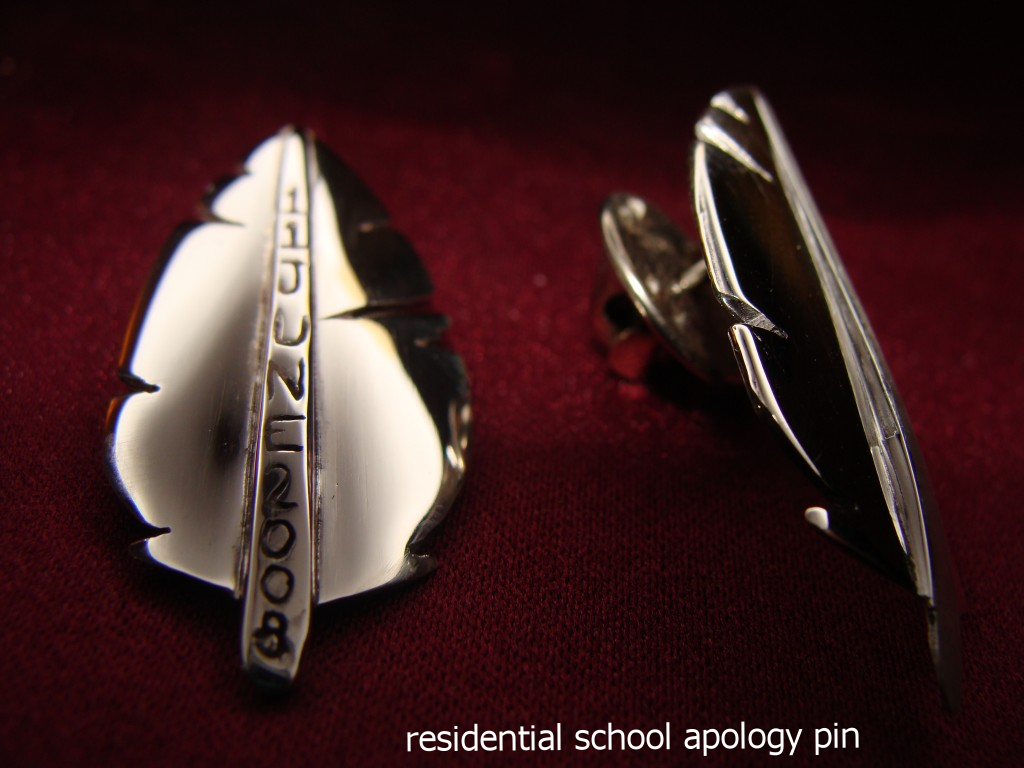Shane Perley-Dutcher
Shane Perley-Dutcher was born an artist and has always been an artist. He remembers creating art as early as 5 years old and has worked in a variety of mediums. He considers himself a mixed media artist now but his business has grown because of the beautiful jewellery he creates as a trained silversmith.
Shane is from the First Nation of Tobique and began his formal training right out of high school when he enrolled in the New Brunswick College of Craft and Design (NBCCD). When Shane first enrolled at NBCCD, he thought that he would like graphic design but he quickly discovered that working on a computer was not for him. He needed something more tactile so he signed up to work with metals in the metal arts program.
“I fell in love with the metals program after just one class,” said Shane. “I enjoyed the process and loved everything about it.”
Shane graduated from NBCCD with honours with distinction and then returned to take advanced studies in jewellery design. After a year off, Shane continued his studies at Atlantic Business College where he received his diploma in business administration. Shane believes that if you are committing yourself to being an artist, you need to take formal training.
“I can’t stress enough how formal training in the arts is absolutely necessary,” said Shane. “The all-around capacity that you gain from being in a variety of courses in the artistic field is very important. It gives you a good foundation for beginning a profession in the arts, it gives you an advantage by making you look more serious as an artist, and it makes you more competitive for grants that are available. No matter how good you are, there are skills that you need to learn in order to become a professional artist.”
Shane has also had many mentors throughout his career. Starting with Shirley Bear-Clare at a very young age, to Ned Bear, his high school teacher, and many others who have had a positive impact on his life.
“Mentors have taught me how to enjoy the process, how to be analytical and how to be creative,” said Shane. “Mentors still challenge my outlook and how I see things. Having them encourages me to push and ask the right questions. Mentors are very important for all stages of your life and I wouldn’t be where I am without mentors.”
After Shane finished his studies he started his business, Aduksis Jewellery Design. Becoming an entrepreneur wasn’t an easy path for him but it is one that many artists take in order to earn a living from their art.
“Turning my passion into a career was probably the biggest challenge I’ve encountered as an artist because I had to realise that I couldn’t do it alone,” said Shane. “You have an image in your head of being an artist and people coming and wanting your work; in reality that is not how it happens. You need to learn how to ask for help. People in my circle and in different organizations have helped me. I had to work out of my parent’s garage for 2 years because I couldn’t pay rent. You have to use the people in your close circle who support you no matter what in order to move forward. There are things that will test whether you can stay in it for the long haul. I had to get creative in finding solutions on how to pursue my art.”
One of the things that Shane did to continue pursuing his art was to move to Ottawa for a change of environment. This opened up more opportunities for him.
“I found a lucrative market for my product in Ottawa and that proved to be a game changer for me,” said Shane. “I got on the map when I moved to a larger market and I was seen by a larger audience. I was working full-time as a silversmith, including having people working for me.”
Eventually Shane came back to New Brunswick for family reasons. It was important to him and his wife for their daughter to be around her family, to learn to speak her language, and to be exposed to her culture.
Shane’s culture and heritage has had a huge influence on his art. He finds that his art keeps him grounded and centred both spiritually and emotionally.
“Seeing my own people’s motifs and creativity has always inspired me,” said Shane. “I love texture in my art. I love simplistic design. I love meaning. I love symbols and motifs. I love art that is very conceptual and has history to it; it automatically brings me to my own culture. It is an integral part of our world view as a Wabanaki. I believe that all of our people are artists. We have that creative expression to our nature and it is important to keep that alive. We need people in the artistic field who are passionate about the creative mediums that were alive 500 yrs ago, and who want to keep them alive. The art needs to be passed on.”
Not only is Shane an artist, he is also an advocate for the arts and he believes that it provides benefits in many ways.
“Having a foundation in the arts is a transferrable skill, being creative is transferable to any career you go into,” said Shane. “Being creative can help you think quickly on your feet. Because of my background, I have always been able to think and come up with a solution. Creativity is probably one of the best problem solving techniques that you can have and that you will carry with you no matter what you do. Creativity isn’t just about making orange out of yellow and red. It is about coming up with unique answers to problems.”
In addition to owning his own business, Shane currently works at NBCCD as one of two Aboriginal arts instructors. He teaches entrepreneurship, sculpting, wood carving and ash basket making.
“I’m happy having a part-time business and doing teaching as well,” said Shane. “I enjoy the relationships with people and I like my job. It allows me to be creative and it helps me to inspire other artists who are going down the path that I have gone. I like to work with young people and support them and point them in the right direction. I have 7 younger siblings so it comes naturally to me to be a big brother.”
Having a part-time business does come with challenges though.
“My problem isn’t finding work, my problem is fulfilling the orders in a timely manner,” said Shane. “I can’t say no sometimes and it takes a long time to get the work done. One challenge is being a bit more strategic on how to operate as a part-time business. It’s important to find balance as I have a full-time job.”
Shane’s business has evolved over the years. While in Ottawa, he focused on manufacturing and selling, now he still does the manufacturing and selling but he also does wholesale. As well, he creates one-of-a-kind products that you can’t get elsewhere and limited production commissions. He sells most of his products by word-of-mouth, through his wholesale business, through Facebook and his website.
“There are a lot of art pieces that I am really proud of,” said Shane. “However, the residential school apology pin was the piece that I am most proud of, it wasn’t the most technically challenging piece I ever made but it has the most meaning behind it. 500 of those pins were given to residential school survivors across Canada. It’s the meaning behind it that gives it its weight. Since then I’ve had countless orders for the pins. That pin has gone to a lot of different places.”
JEDI has been a proud supporter of Shane’s work over the years. JEDI funded Shane’s first position at NBCCD as a recruiter before he became an instructor there and JEDI sponsored Shane’s trip to the SOFA (Sculpture Object Functional Art) conference in Chicago when he was invited as one of 4 New Brunswick representatives to attend the conference.
“JEDI supported me to go to Chicago for the SOFA conference,” said Shane. “SOFA represents the top galleries from across the world. It was a mind-blowing experience. I had never seen art of that calibre in my life. It inspired me and gave me a vision of where I would like to see my work. It gave me the opportunity to witness the best of the best, to network, and to show some of my work. It was an invaluable experience.
“JEDI has helped me to maintain my connection with the professional community,” said Shane. “They have purchased my work. They have supported me in many ways. Without that it would be hard for me to maintain a presence in New Brunswick.”
JEDI wishes Shane continued success in his endeavours and knows that his hard work and persistence will continue to pay off.




